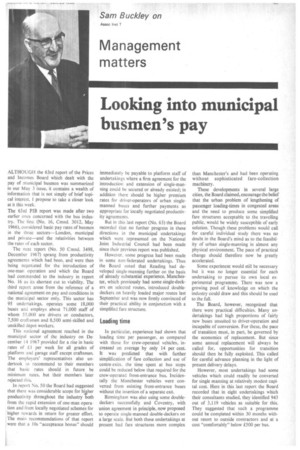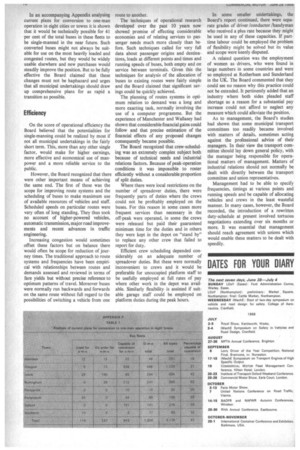Looking into municipal busmen's pay
Page 71

Page 72

If you've noticed an error in this article please click here to report it so we can fix it.
ALTHOUGH the 63rd report of the Prices and Incomes Board which dealt with the pay of municipal busmen was summarized in our May 3 issue, it contains a wealth of information that is not simply of brief topical interest. 1 propose to take a closer look at it this week.
The 63rd PIB report was made after two earlier ones concerned with the bus industry. The first (No. 16, Cmnd. 3012, May 1966), considered basic pay rates of busmen in the three sectors—London, municipal and private—and the relativities between the rates of each sector.
The next report (No. 50 Cmnd. 3498, December 1967) sprang from productivity agreements which had been, and were then being negotiated for the introduction of one-man operation and which the Board had commended to the industry in report No. 16 as its shortest cut to viability. The third report arose from the reference of a national agreement on pay and conditions in the municipal sector only. This sector has 95 undertakings, operates some 18,000 buses and employs about 71,000 staff of whom 55,000 are drivers or conductors, 7,500 craftsmen and 8,500 semi-skilled and unskilled depot workers.
This national agreement reached in the municipal sector of the industry on December 14 1967 provided for a rise in basic rates of 1 per week for all grades of platform and garage staff except craftsmen. The employers' representatives also undertook to recommend to their members that basic rates should in future be minimum rates, but their members later rejected [his, In report No. 50 the Board had suggested that there was considerable scope for higher productivity throughout the industry both from the rapid extension of one-man operation and from locally negotiated schemes for higher rewards in return for greater effort. The main recommendations of that report were that a 10s "acceptance bonus" should immediately be payable to platform staff of undertakings where a firm agreement for the introduction and extension of single-manning could be secured or already existed; in addition there should be higher premium rates for driver-operators of urban singlemanned buses and further payments as appropriate for locally negotiated productivity agreements.
But in this last report (No. 63) the Board recorded that no further progress in these directions in the municipal undertakings which were represented on the National Joint Industrial Council had been made since their previous report was published.
However, some progress had been made in some non-federated undertakings. Thus the Board noted that Reading had developed single-manning further on the basis of already substantial experience. Manchester, which previously had some single-deckers on selected routes, introduced doubledeckers on heavily loaded major routes last September and was now firmly convinced of their practical ability in conjunction with a simplified fare structure.
Loading time
In particular, experience had shown that loading time per passenger, as compared with those for crew-operated vehicles, increased on average by only 14 per cent. It was predicted that with further simplification of fare collection and use of centre-exits. the time spent at bus stops could be reduced below that required for the crew-operated front-entrance bus. Incidentally the Manchester vehicles were converted from existing front-entrance buses without the insertion of a separate exit.
Birmingham was also using some doubledeckers successfully and Coventry, with union agreement in principle, now proposed to operate single-manned double-deckers on a large scale. But both these undertakings at present had fare structures more complex than Manchester's and had been operating without sophisticated fare-collection machinery.
These developments in several large cities, the Board claimed, encourage the belief that the urban problem of lengthening of passenger loading-times in congested areas and the need to produce some simplified fare structures acceptable to the travelling public, would be widely susceptible of early solution. Though these problems would call for careful individual study there was no doubt in the Board's mind as to the feasibility of urban single-manning in almost any physical environment. The pace of practical change should therefore now be greatly accelerated.
Some experiment would still be necessary but it was no longer essential for each undertaking to pursue its own local experimental programme. There was now a growing pool of knowledge on which the industry could draw and this should be used to the full.
The Board, however, recognized that there were practical difficulties. Many undertakings had high proportions of fairly new buses unsuited to driver-operation and incapable of conversion. For these, the pace of transition must, in part, be governed by the economics of replacement. But since some annual replacement will always be called for, opportunities for transition should then be fully exploited. This called for careful advance planning in the light of present delivery delays.
However, most undertakings had some vehicles which could readily be converted for single manning at relatively modest capital cost. Here in this last report the Board recorded that in eight undertakings which their consultants studied, they identified 943 out of 3,119 vehicles as suitable for this. They suggested that such a programme could be completed within 30 months without resort to outside contractors and at a cost "comfortably" below £,500 per bus. In an accompanying Appendix analysing current plans for conversion to one-man operation in eight cities or towns it is shown that it would be technically possible for 41 per cent of the total buses in these fleets to be single-manned in the near future. Such converted buses might not always be suitable for use on the most heavily loaded and congested routes, but they would be widely usable elsewhere and new purchases would steadily improve the position. But to be fully effective the Board claimed that these changes must not be haphazard and urges that all municipal undertakings should draw up comprehensive plans for as rapid a transition as possible.
Efficiency
On the score of operational efficiency the Board believed that the potentialities for single-manning could be realized by most if not all municipal undertakings in the fairly short term. This, more than any other single factor, would make for higher earnings, more effective and economical use of manpower and a more reliable service to the public.
However, the Board recognized that there were other important means of achieving the same end. The first of these was the scope for improving route systems and the scheduling of buses to make maximum use of available resources of vehicles and staff. Seheduled speeds on particular routes were very often of long standing, They thus took no account of higher-powered vehicles, automatic transmission, major road improvements and recent advances in traffic engineering.
Increasing congestion would sometimes offset these factors but on balance there would often be scope for reduction of journey times. The traditional approach to route systems and frequencies have been empirical with relationships between routes and demands assessed and reviewed in terms of fare yields but without precise reference to optimum patterns of travel. Moreover buses were normally run backwards and forwards on the same route without full regard to the possibilities of switching a vehicle from one route to another.
The techniques of operational research developed over the past 10 years now showed promise of effecting considerable economies and of relating services to passenger needs much more closely than before. Such techniques called for very full data about passenger origins and destinations, loads at different points and times and running speeds of buses, both empty and on service between terminals. Given this the techniques for analysis of the allocation of buses to existing routes were fairly simple and the Board claimed that significant savings could be quickly achieved.
The planning of routes systems in optimum relation to demand was a long and more exacting task, normally involving the use of a computer programme. But the experience of Manchester and Wallasey had shown that considerable financial gains could follow and that precise estimation of the financial effects of any proposed changes consequently became possible.
The Board recognized that crew-scheduling was an extremely complex subject both because of technical needs and industrial relations factors. Because of peak-operation conditions it was impossible to roster efficiently without a considerable proportion of split duties.
Where there were local restrictions on the number of spreadover duties, there were frequently parts of duties where the crews could not be profitably employed on the buses. For this reason in some cases more frequent services than necessary in the off-peak were operated, in some the crews were released but paid their guaranteed minimum time for the duties and in others they were kept in the depot on "stand by" to replace any other crew that failed to report for duty.
Efficient crew scheduling depended considerably on an adequate number of spreadover duties. But these were normally inconvenient to crews and it would be preferable for unoccupied platform staff to be usefully employed at full rates of pay where other work in the depot was available. Similarly flexibility is assisted if suitable garage staff could be employed on platform duties during the peak hours. In some smaller undertakings, the Board's report continued, there were separate grades of driver /conductor /handyman who received a plus rate because they might be used in any of these capacities. If parttime labour could be employed the problem of flexibility might be solved but its value and scope were keenly disputed.
A related question was the employment of women as drivers, who were found in large numbers in some countries and were so employed at Rotherham and Sunderland in the UK. The Board commented that they could see no reason why this practice could not be extended. It pertinently added that an industry where both sides pleaded staff shortage as a reason for a substantial pay increase could not afford to neglect any measure which could alleviate the position.
As to management, the Board's studies had shown that some municipal transport committees too readily became involved with matters of details, sometimes acting against the professional advice of their managers. In their view the transport committee should lay down general policy, with the manager being responsible for operational matters of management. Matters of industrial relations should not normally be dealt with directly between the transport committee and union representatives.
Management had to be able to specify frequencies, timings at various points and running speeds and be capable of allocating vehicles and crews in the least wasteful manner. In many cases, however, the Board recorded, the introduction of a rewritten duty-schedule at present involved tortuous negotiations extending over six months or more. It was essential that management should reach agreement with unions which would enable these matters to be dealt with speedily.
























































































































